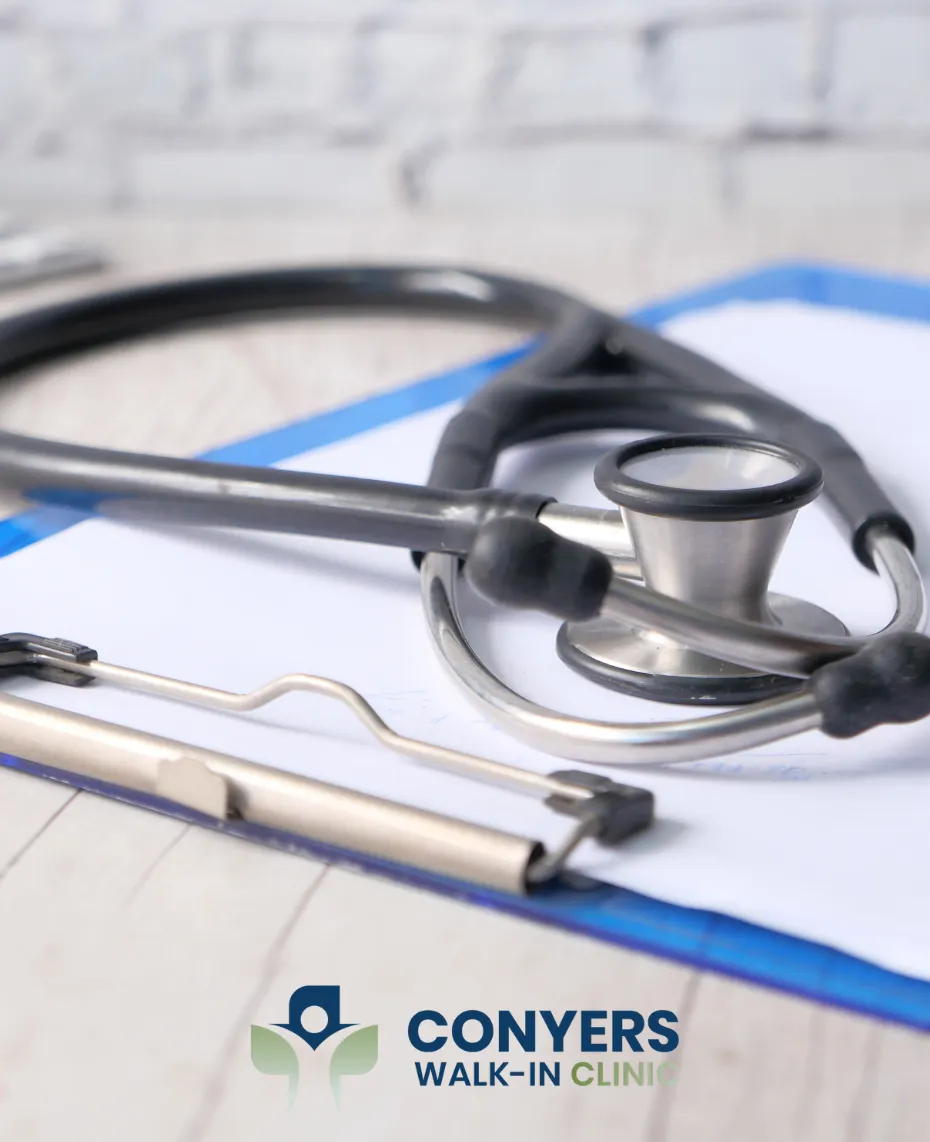Healthcare with or without an appointment
Conyers
Walk-in Clinic
Healthcare with a special touch.
We provide comprehensive medical care to the entire family.
Some of our most popular services

IV Hydration
Rejuvenation and Rehydration using IV treatments

Weight Loss
Medical Weight Loss Services to help you meet your goals.

Prescription Refills
Refill prescriptions based
on order.

Healthcare
Healthcare professionals for regular checkups
Why choose Conyers walk-in Clinic?
Conyers Walk-in Clinic
Conyers Walk-In Clinic provides comprehensive medical care to the entire family. Our clinic uses evidence-based medicine to provide safe and efficient care.
At Conyers Walk-In Clinic our Family Nurse Practitioners are board-certified by the American Academy of Nurse Practitioners with extensive medical training in family medicine.
Quick Connect Form
Testimonials
Healthcare for the entire family
Looking for a clinic?
Get healthcare for yourself and your whole family with or without an appointment.
Clinic Features
All good Healthcare facilities need features that benefit their clients.
You can expect this at your first visit to our practice.
Major insurance plans accepted*
Cash pay for treatment available
HSA Flex cards accepted
Debit/Credit cards accepted
Affordable-fast service
Debit/Credit cards accepted
Healthcare with or without insurance
We Accept Almost All Major Insurance Plans

We accept most insurances, including commercial, Medicaid, and medicare. Patients can be seen without insurance as well. We understand that not everyone has health insurance, but that doesn’t stop us from providing the best quality healthcare possible.
If you do have health insurance, you can expect to pay for your visit using the insurance provider of your choice. We file insurance claims on your behalf, and you receive a statement from the insurance company that states what is covered, as well as an itemized list of services and supplies provided. Your insurance provider will reimburse you for those amounts.
Operating hours
Monday - 08:30a - 5:00p
Tuesday - 08:30a - 5:00p
Wednesday - 08:30a - 5:00p
Thursday - 08:30a - 5:00p
Friday - 08:30a - 1:00p
Saturday - 9:00a - 1:00pm
Sunday - Closed

(optional) Self-pay Pricing
Services
The best services and professionals are available to you, at a price that should fit your circumstance.
$125
GLP-1
(Weight Loss Treatments)
$125
Uninsured Office Visit
(Non-Emergency)
Prices starting at:
$145
IV Therapy
(In- Office Treatments)
$45
Sports Physical
(In Office)

Our 5 Core Principles
Here at the Conyers Walk-in Clinic, we strive to provide you with the highest level of care before, during, and after your visit. We do this through 5 core principles that govern the way we operate.
We will employ open and honest communication with you as a patient and partner in your healthcare.
We will employ open and honest communication with you as a patient and partner in your healthcare.
We will maintain a safe environment for all of our patients by ensur
ing that we have efficient systems and processes to maximize the quality of care.
We believe we have a responsibility to be good caretakers of our patients' time, energy, and finances.
We will offer a broad range of service in a friendly and efficient manner.
IV Hydration & Medical Weight loss Services
Our Most Popular Concierge Services

IV Hydration
Hydration therapy aims to deliver fluid directly into your bloodstream via an IV inserted into your arm. Additionally, vitamins, electrolytes, antioxidants, and even medication may be included in fluids. Hydration therapy replenishes fluids in a way that drinking fluids cannot because it allows liquids to circulate quickly throughout your body.

Schedule an IV Hydration appointment
Hydration therapy aims to deliver fluid directly into your bloodstream via an IV inserted into your arm. Additionally, vitamins, electrolytes, antioxidants, and even medication may be included in fluids. Hydration therapy replenishes fluids in a way that drinking fluids cannot because it allows liquids to circulate quickly throughout your body.
See a doctor when you need to!
Conyers' Favorite patient-centered practice
Average rating

Conyers Walk-In Clinic provides comprehensive medical care to the entire family. Our clinic uses evidence-based medicine to provide safe and efficient care. At Conyers Walk-In Clinic our Family Nurse Practitioners are board-certified by the American Academy of Nurse Practitioners with extensive medical training in family medicine.
Contact
Address: 1804 Overlake Dr. Suite A, Conyers GA 30013
(Next to Dr. Shurett Dental Group)
Phone: 770-679-9935
Fax: 770-679-9938
Login to the Site
Schedule an appointment
Opening Hours
M - Th (8:30pm – 5:00pm)
Friday: (8:30pm - 1:00pm)
Saturday: (9:00am - 1:00pm)
Sunday: CLOSED
©2025 – Joe Martin & Associates, LLC
Made With ❤️ in Atlanta
